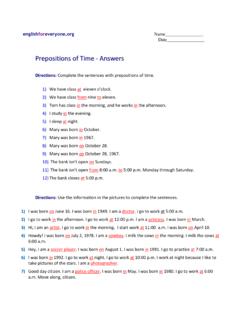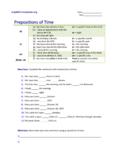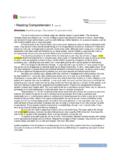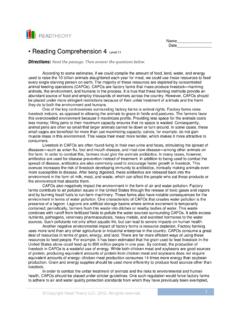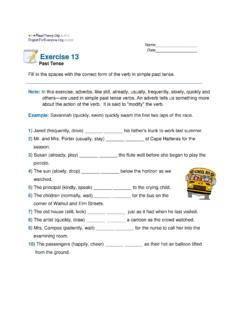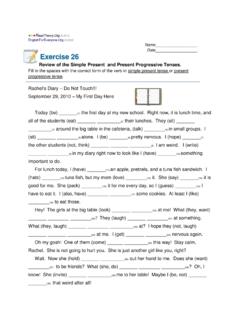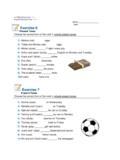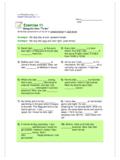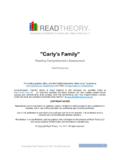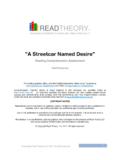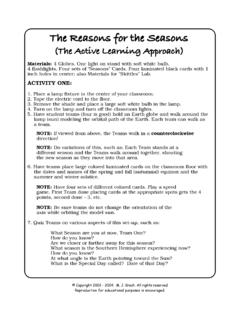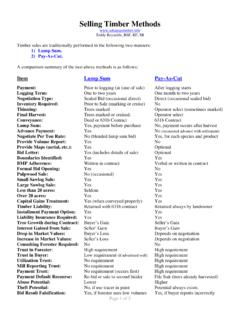Transcription of READTHEORY - English for Everyone
1 Copyright read theory LLC, 2012. All rights reserved. 1 READTHEORY TEACHING STUDENTS TO read AND THINK CRITICALLY ""SSuummmmeerr RRaaiinn"" RReeaaddiinngg CCoommpprreehheennssiioonn AAsssseessssmmeenntt For exciting updates, offers, and other helpful information, follow us on Facebook at and Twitter at Comprehension materials similar to those featured in this workbook are available online at -- an interactive teaching tool where students can take reading comprehension quizzes, earn achievements, enter contests, track their performance, and more. Supplementary materials to this workbook are available in printable worksheet form at COPYRIGHT NOTICE Reproduction and or duplication on websites, creation of digital or online quizzes or tests, publication on intranets, and or use of this publication for commercial gain is strictly prohibited.
2 Use of this publication is restricted to the purchaser and his or her students. This publication and its contents are non-transferrable between teachers. All materials in our publications, such as graphics, text, and logos are the property of read theory LLC and are protected by United States and international copyright laws. Copyright read theory LLC, 2012. All rights reserved. READTHEORY Passage and Questions Copyright read theory LLC, 2012. All rights reserved. 2 Name_____ Date_____ RReeaaddiinngg CCoommpprreehheennssiioonn AAsssseessssmmeenntt DDiirreeccttiioonnss:: read the passage.
3 Then answer the questions below. SSuummmmeerr RRaaiinn The worst days of any summer are the rainy ones. We spend all year looking forward to nice weather and long, hot days. All of winter, with its dreary gray days and bitter cold, we dream of those endless days at the beach, laying on the sand and soaking in the bright and burning sun. And then, summer comes, and it rains. As a child, I would wake up to rainy summer days and come close to crying. It wasn t fair. We suffered through months of school and miserable weather for those scant ten weeks of freedom and balmy weather. Any day that I could not spend at the beach or playing ball with my friends seemed like a punishment for something I didn t even do.
4 On those rainy summer days, I had nothing fun to do and could only sit inside, staring out at the rain like a Dickensian orphan. I was an only child, so there was no one else to play with. My father worked from home, so I was not truly alone, but he could not actively play with me since he was technically at work. It was those days that I would resign myself to whatever was on television or any books that I could find lying around. I d crawl through the day and pray each night that the rain would not be there the next day. As an adult, though, my opinion of summer rain has changed. When you have to work every day, summer is not as eagerly anticipated.
5 Mostly, the days run together, bleeding into each other so that they no longer seem like separate entities and instead feel like continuations of the same long day. Everything seems monotonous and dull, and an ennui or listlessness kicks in. Such a mindset makes you cheer for anything new or different. I spend the winter dreaming of summer and the summer dreaming of winter. When summer comes, I complain about how hot it is. And then I look forward to the rain, because the rain brings with it a cold front, which offers a reprieve admittedly one that is all too short from the torture of 100 and humid days. Rainy days are still the worst days of the summer, but summer rain today means positively beautiful and considerably cooler weather tomorrow.
6 1) The passage makes use of language that is A. metaphorical B. rhetorical C. formal D. ambiguous 2) According to the passage, summer is different for adults because A. rain brings with it cold temperatures for the following days B. the weather is much warmer than it is for children C. they do not get a long time off from work for the season D. they better know how to occupy their downtime 3) According to the passage, which of the following is a true statement about the narrator as a child? A. He or she was often bored on summer days. B. He or she preferred cooler weather. C. He or she liked staying indoors. D. He or she had no siblings.
7 READTHEORY Questions Copyright read theory LLC, 2012. All rights reserved. 3 4) Compared to how he or she was as a child, the narrator as an adult is A. more realistic B. less excitable C. more idealistic D. less calm 5) As used in the final paragraph, the word reprieve most nearly means A. a permanent conclusion B. a short continuation C. a higher level of pain D. a temporary break 6) The author of this passage describes his or her feelings about rainy summer days. In general, how do you feel about such days? Do you agree with the author s opinions, or do you not mind this type of weather?
8 Briefly explain your views below. _____ _____ _____ _____ _____ _____ _____ _____ _____ _____ _____ _____ _____ 7) In paragraph 4, the author describes why he or she no longer looks forward to summertime the way he or she used to do as a child. What do you think of this change? Do you believe that you will come to feel this way one day? Why or why not? _____ _____ _____ _____ READTHEORY Questions Copyright read theory LLC, 2012. All rights reserved. 4 _____ _____ _____ _____ _____ _____ _____ _____ _____ 8) The author writes in paragraph 4 that he or she spend[s] the winter dreaming of summer and the summer dreaming of winter.
9 On the other hand, many people would say that they have specific favorite seasons or times of year. How do you feel? Do you have a favorite season, or do you always look forward to whatever is to come? Why? _____ _____ _____ _____ _____ _____ _____ _____ _____ _____ _____ _____ _____ _____ _____ _____ READTHEORY Answers and Explanations Copyright read theory LLC, 2012. All rights reserved. 5 1) A Question Type: Inference Throughout the passage, the narrator uses language that is figurative and not literal. He or she refers to soaking in the bright and burning sun, needing to crawl through the day when it was raining outside, and the days bleeding into each other.
10 One cannot literally soak in the sun, since the sun is not wet. Additionally, the narrator does not mean he or she literally crawled around the house on hands and knees but instead that the day passed slowly. Finally, days cannot bleed or even run into each other like liquids can, so the days did not literally bleed. All of these are examples of figurative or metaphorical language. Because of this, choice (A) is correct. Rhetorical language is language used to try to persuade someone or to impress someone. Such language would, thus, be used primarily on a persuasive essay. This passage is not persuasive, though, as the narrator never attempts to convince the reader of anything.
